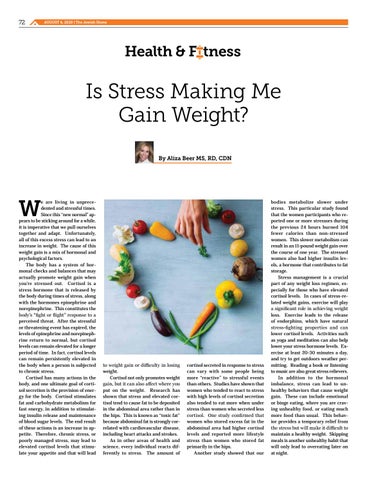72 34
AUGUST 6, 2020 | The Jewish Home OCTOBER 29, 2015 | The Jewish Home
Health & F tness
Is Stress Making Me Gain Weight? By Aliza Beer MS, RD, CDN
W
e are living in unprecedented and stressful times. Since this “new normal” appears to be sticking around for a while, it is imperative that we pull ourselves together and adapt. Unfortunately, all of this excess stress can lead to an increase in weight. The cause of this weight gain is a mix of hormonal and psychological factors. The body has a system of hormonal checks and balances that may actually promote weight gain when you’re stressed out. Cortisol is a stress hormone that is released by the body during times of stress, along with the hormones epinephrine and norepinephrine. This constitutes the body’s “fight or flight” response to a perceived threat. After the stressful or threatening event has expired, the levels of epinephrine and norepinephrine return to normal, but cortisol levels can remain elevated for a longer period of time. In fact, cortisol levels can remain persistently elevated in the body when a person is subjected to chronic stress. Cortisol has many actions in the body, and one ultimate goal of cortisol secretion is the provision of energy for the body. Cortisol stimulates fat and carbohydrate metabolism for fast energy, in addition to stimulating insulin release and maintenance of blood sugar levels. The end result of these actions is an increase in appetite. Therefore, chronic stress, or poorly managed stress, may lead to elevated cortisol levels that stimulate your appetite and that will lead
to weight gain or difficulty in losing weight. Cortisol not only promotes weight gain, but it can also affect where you put on the weight. Research has shown that stress and elevated cortisol tend to cause fat to be deposited in the abdominal area rather than in the hips. This is known as “toxic fat” because abdominal fat is strongly correlated with cardiovascular disease, including heart attacks and strokes. As in other areas of health and science, every individual reacts differently to stress. The amount of
cortisol secreted in response to stress can vary with some people being more “reactive” to stressful events than others. Studies have shown that women who tended to react to stress with high levels of cortisol secretion also tended to eat more when under stress than women who secreted less cortisol. One study confirmed that women who stored excess fat in the abdominal area had higher cortisol levels and reported more lifestyle stress than women who stored fat primarily in the hips. Another study showed that our
bodies metabolize slower under stress. This particular study found that the women participants who reported one or more stressors during the previous 24 hours burned 104 fewer calories than non-stressed women. This slower metabolism can result in an 11-pound weight gain over the course of one year. The stressed women also had higher insulin levels, a hormone that contributes to fat storage. Stress management is a crucial part of any weight loss regimen, especially for those who have elevated cortisol levels. In cases of stress-related weight gains, exercise will play a significant role in achieving weight loss. Exercise leads to the release of endorphins, which have natural stress-fighting properties and can lower cortisol levels. Activities such as yoga and meditation can also help lower your stress hormone levels. Exercise at least 20-30 minutes a day, and try to get outdoors weather permitting. Reading a book or listening to music are also great stress relievers. In addition to the hormonal imbalance, stress can lead to unhealthy behaviors that cause weight gain. These can include emotional or binge eating, where you are craving unhealthy food, or eating much more food than usual. This behavior provides a temporary relief from the stress but will make it difficult to maintain a healthy weight. Skipping meals is another unhealthy habit that will only lead to overeating later on at night.


















